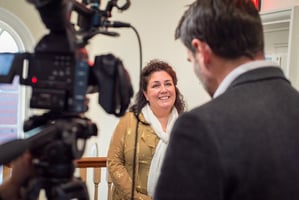Your journalist is ready to fix a time for an interview. You’ve meticulously constructed your...
Any interview really should be seen as an opportunity to get your message across, to raise the reputation of your company and a way of taking control of the news agenda. It’s about playing the game. Journalists need you for a story and you need them as a facilitator to get your message out to your audience. So in order to help you start the beginnings of a fruitful relationship, here are our top ten tips on how to best engage with the journalists and the media.
Tip One : Understand the journalist’s agenda and audience. This will then allow you to align your messages with their needs, ensuring you get the most air-time/column inches and build a two-way relationship. When a journalist knows you understand their needs and can provide their audience with something worth hearing they’ll be back for more in the future.
Tip Two : Devote time to prepare for your interview. Plan your key messages, refresh those media skills. It’s not just what you say but how you say it. Modern day audiences are wary of corporate speaking media trained robots. Real people make the headlines.
Tip Three: Keep it simple and avoid jargon. You may spend most of your working life talking in acronyms, but no one outside of your working world has any idea what you’re talking about. Think of it as if you were trying to explain the message to your mum or dad.
Tip Four: Be confident, sincere and honest. Viewers and listeners will soon judge whether they think you look and sound trustworthy. You have to sound like you care, that you understand the problem or issue and are in control of the situation. If you deny or say nothing to the media it can only end badly.
Tip Five: Repeat your message points wherever possible. If you’ve spent a great deal of time and energy working out exactly what they are, don’t throw the opportunity away to push the message as often as you can. Also, hit the ground running – don’t wait until the end of the interview to release your best soundbite.
Tip Six: Always use examples and case studies. Don’t express an opinion without backing it up with a fact or an example. Process changes don’t make the news – the people that the processes affect is what will make it interesting.
Tip Seven: Master the art of the soundbite. We all want to see or hear our news in small bite size chunks. Soundbites are great for broadcast journalists and mean your messages are less likely to be harshly edited or misinterpreted.
Tip Eight: There is no such thing as ‘off the record’. There may be press complaint procedures after the news is reported but let’s face it – once it’s a headline, it’s a headline.
Tip Nine: Never repeat a negative phrase or word that has been used by the reporter. If you repeat it you will sound like you are agreeing with the journalist and they will almost certainly use it in their edit or headline.
Tip Ten: Never say ‘no comment’. Journalists hate this and they will then invariably go and write the story anyway with someone else’s, potentially damaging, comments instead. A much better option is to try and deflect the question in other ways by bridging away from the negative question and following it up with a positive response that will still interest the journalist and their audience.
In reality, this list could have so easily become a ‘Top 100’. However we tweet daily media tips on Twitter so please search #MFTIPS for more.
Media First are media and communications training specialists with nearly 30 years’ experience. To find out more about our highly practical media skills training courses, contact us here. Don't forget to subscribe to our blog.




